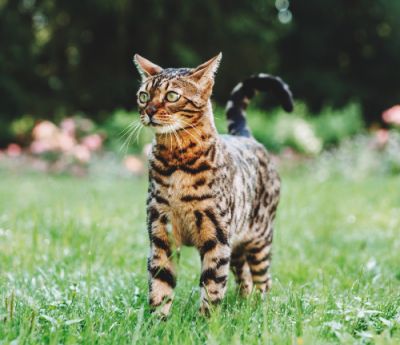ORGANIC Linseed oil for animals


EU/non-EU agriculture
- cold-pressed organic linseed oil for animals
- free from additives
- with valuable omega-3 fatty acids
- for a healthy-looking coat
- strengthens the body's defenses
- produced in Germany
from 121 ratings

Our organic linseed oil from gentle cold pressing is an ideal feed supplement for dogs, cats and horses. The omega-3 fatty acids in linseed oil can have a positive effect on metabolic processes and the appearance of the skin and coat in the event of feed-related deficiencies. The linseed plant, also known as flax, is one of the oldest cultivated plants in the world and is valued for its high content of polyunsaturated omega-3 fatty acids, also known as alpha-linolenic acid, in its seeds. Our linseed oil is cold-pressed from high-quality organic linseed at temperatures below 40 degrees.
Organic linseed oil as a healthy feed supplement
Linseed oil is highly valued as a high-quality edible oil for humans. It is used to prepare salads, muesli and dips as well as for skin care. The oil, which is produced during the cold pressing of brown linseed, is also a high-quality feed additive for your dog, cat or horse. In veterinary medicine, it is valued for its digestive and anti-inflammatory effects, among other things. This cold pressing at temperatures below 40 °C preserves the valuable ingredients in their best form. The native linseed oil is free from additives and contains valuable unsaturated fatty acids, in particular omega-3 fatty acids and lignans.
The essential fatty acids in linseed oil can have a positive effect on dogs, cats and horses suffering from feed-related deficiencies.
- metabolic processes,
- the coat change,
- a shiny coat,
- skin health
- and the immune system
have an effect.
Linseed oil for dogs

Alongside cats, dogs are one of the most popular pets in Germany. A balanced diet also plays an important role for furry friends. Oils such as hemp oil, evening primrose oil, black cumin oil and linseed oil can be fed to dogs as a healthy supplement.
Linseed oil is recommended at every stage of a dog's life. Even as a puppy, a dog can be given around 1 ml per kg of body weight of linseed oil mixed into its food every day. Linseed oil can have a positive effect on the development of the joints and the immune system during the development of a young dog due to the omega-3 fatty acids. Adult dogs under 5 kg body weight are given around 5 ml per day. Larger dogs, from 5 kg, can be given 10 ml of linseed oil. You can simply use a teaspoon as a measure for dosing; a full teaspoon corresponds to around 5 ml of linseed oil.
Linseed oil for barfing
BARF is a type of feeding for carnivorous animals. The term "BARF" stands for "bones and raw food". It refers to the raw feeding of animals such as dogs and cats. The letters are sometimes also associated with "born again raw feeders", which in turn can be translated as "born again raw feeders". The most important ingredients when barfing dogs are meat, bones and offal. Small amounts of fruit and vegetables are also fed. As with eating in the wild, all ingredients are fed raw. Raw feeding increases the dog's intake of omega-6 fatty acids, so omega-3 fatty acids in particular should be supplemented.
However, linseed oil can be fed to small and large dogs as a healthy supplement not only when barfing, but also when feeding suitable dry and wet food.
Linseed oil for cats

Linseed oil is also suitable for cats as an addition to their food. Your velvet paw will benefit from the polyunsaturated fatty acids and linseed oil. Regular feeding of linseed oil can support the skin, coat and immune system. The annual change of coat is particularly tedious for cats with longer coats. In addition to regular brushing, the additional administration of linseed oil helps. Oils stimulate hair growth and can have a particularly supportive effect on dull coats and dry skin.
In nature, a cat's diet consists of small mammals such as mice, birds and insects. These prey animals also provide the cat with a small amount of vegetarian food, which is found in the stomach contents of the prey. Just like dogs, cats can also be fed an oil when barfing. The vitalizing effect of linseed oil, hemp oil or evening primrose oil is a valuable addition to barfing, dry or wet food.
Cats can be given 1 ml per kg of body weight. An adult cat weighing 5 kg would therefore receive a teaspoon of linseed oil several times a week. Caution: Black cumin oil and black cumin pellets are poisonous for cats as, unlike horses and dogs, they cannot completely break down bitter substances.
Linseed oil for horses

Cold-pressed oils are popular with hobby riders, professional riders and vets as a healthy feed supplement. The high amounts of polyunsaturated fatty acids in natural oils are particularly important for the horse's organism - especially omega-3 fatty acids. These important fatty acids must be supplied to horses through their diet as they cannot be produced by the body itself. Omega-3 fatty acids are mainly found in vegetable fats, including linseed oil. Pasture grass and plant seeds also contain omega-3 fatty acids. They have an anti-inflammatory effect not only in the human body, but also in the horse's body. Grazed pastures or hay harvested late can lead to a lack of omega-3. In addition, horses often have an excess of omega-6 fatty acids in their blood due to high amounts of concentrated feed containing cereals, which have a pro-inflammatory effect in excess. This excess can be balanced out by adding linseed oil. This can prevent long-term damage to the horse's organism.
In addition to maintaining a healthy balance of polyunsaturated fatty acids, the addition of linseed oil has other positive effects. It keeps the horse's skin supple and, when fed regularly, ensures a healthy-looking and shiny coat. Horses with sensitive skin in particular can benefit from feeding linseed oil. The skin becomes more elastic and dry patches of skin can be reduced. The addition of valuable linseed oil has proven to be particularly effective in supporting the shedding process in spring or fall. Linseed oil can also have a positive effect on hoof quality and improve blood flow in the event of feed-related deficiencies. Oils are also solvents for fat-soluble vitamins and offer protection for internal organs and the nervous system. Linseed oil can provide warmth protection, especially in cold months, as it is high in calories and therefore an ideal supplementary feed for the heavy-fed horse. In winter, the oil can help the horse to waste less of its own fat reserves and thus maintain its body temperature better. In addition, the high mucilage content stimulates intestinal activity and can help prevent colic.
You can also try our linseed press cake, which is produced when brown linseed is processed into linseed oil. The pellets, which we also offer in the varieties black cumin, milk thistle and night candle, are a high-quality feed for horses.
Feeding recommendation

- 5 ml for dogs under 5 kg
- 10 ml for dogs over 5 kg
- 1 ml per kg body weight for cats
- 50 - 75 ml for ponies or horses, depending on size
Linseed oil is best absorbed when it is given over the feed or mixed into the feed. Experience has shown that linseed oil is readily accepted by dogs and horses. Cats eat linseed oil best when it is mixed into their wet food. You can simply use a teaspoon as a measure for dosing; a full teaspoon corresponds to approx. 5 ml linseed oil.
Always provide your pet with sufficient fresh drinking water.
Please always store the organic linseed oil tightly closed in the refrigerator.
Our linseed oil is an untreated natural product. A natural sediment, cloudiness and color changes are natural
Ratings
Specification and ingredients
Linseed oil for animals
Average energy and nutrient content for 100 g
As a product of nature the composition of the oil can vary, the given specifications are therefore average values.





 Hemp oil for animals
Hemp oil for animals Black cumin oil for animals
Black cumin oil for animals